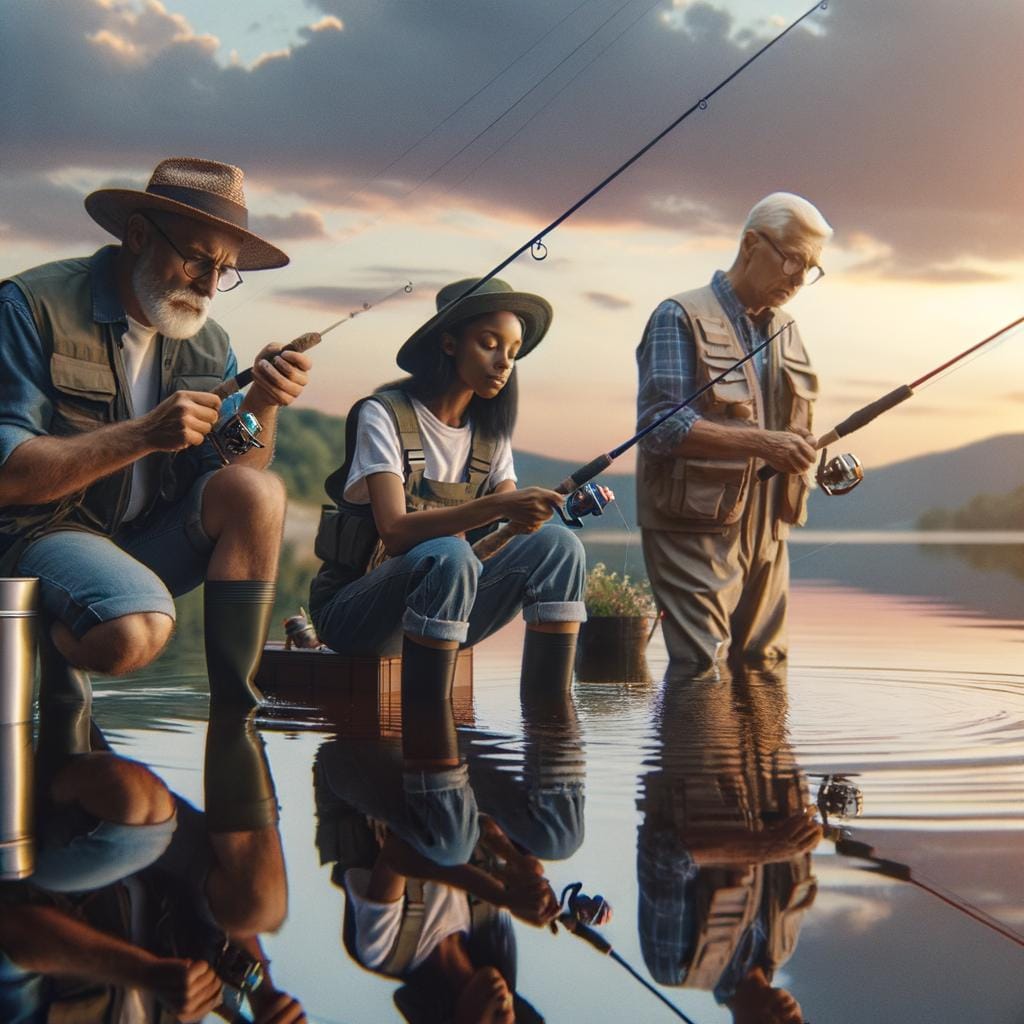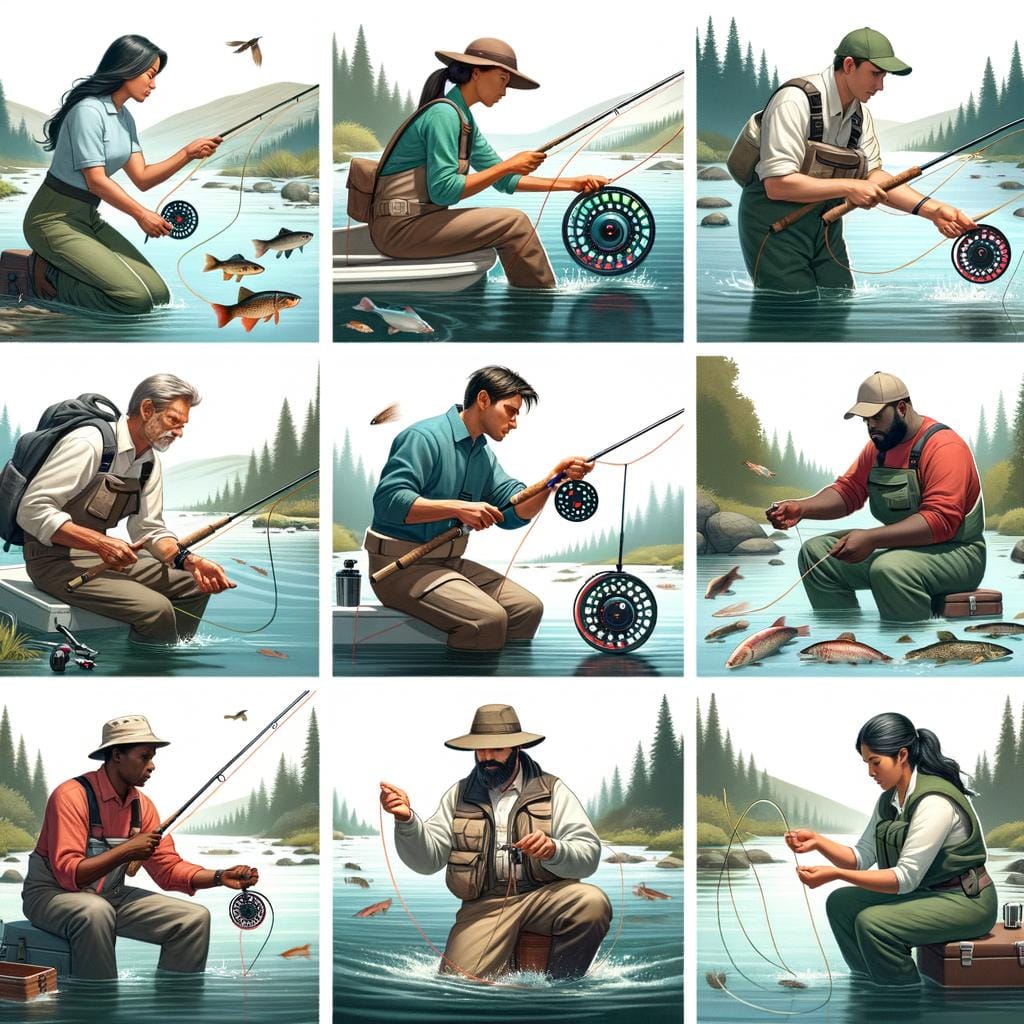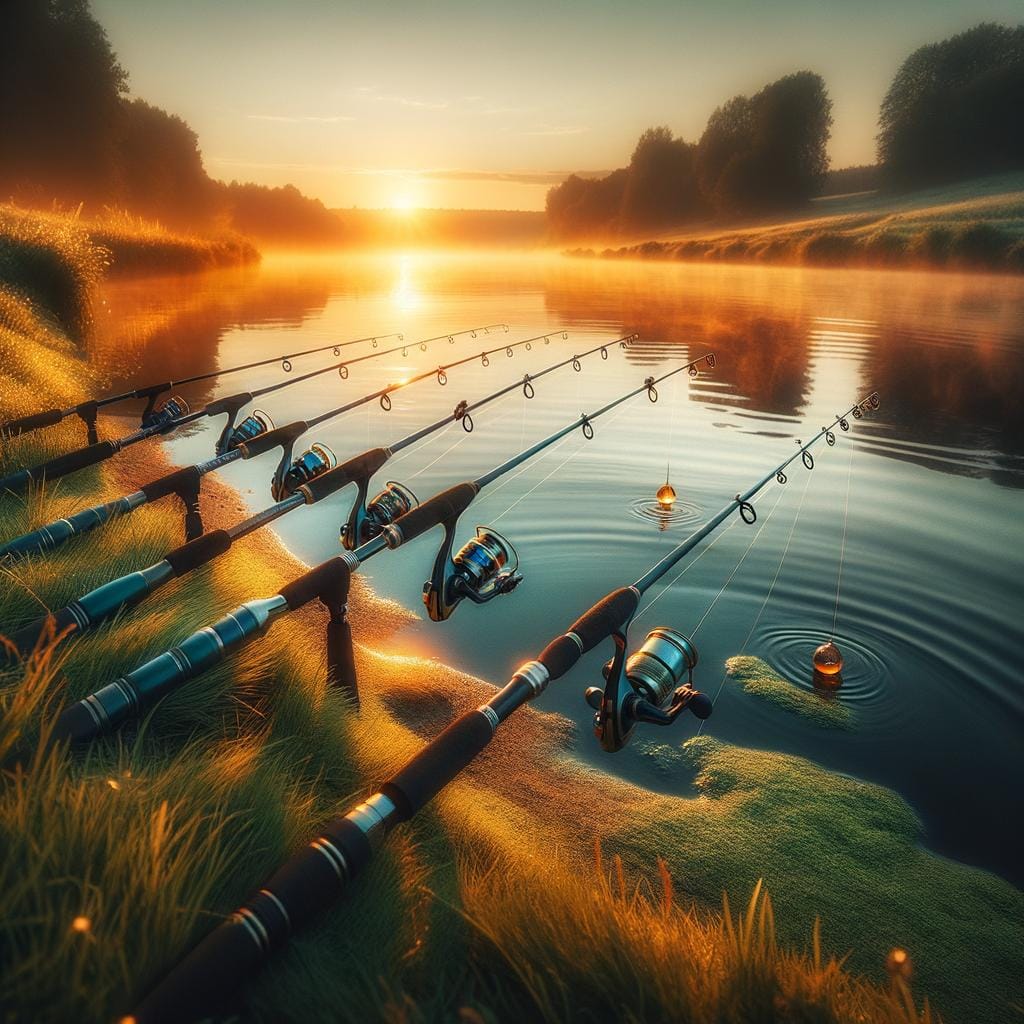Sport fishing, also known as recreational fishing, is a popular outdoor activity enjoyed by millions around the world. This beginner’s guide will provide you with the essential information you need to get started in this exciting hobby. Whether you’re casting a line from a pier or trolling in deep waters, sport fishing offers a unique experience that combines skill, patience, and adrenaline-pumping excitement.
To begin your journey into the world of sport fishing, it’s important to understand the basics. From selecting the right equipment to learning about different fishing techniques, this guide will walk you through everything you need to know to become a successful angler. With the keyword “sport fishing” in mind, we’ll explore topics such as choosing the right rods, reels, and tackle, as well as understanding different types of fish and their habitats.
As you delve deeper into the art of sport fishing, you’ll discover top destinations around the world that offer unparalleled opportunities for anglers. From serene freshwater lakes to bountiful oceans teeming with marine life, there are countless places where you can test your skills and reel in some impressive catches. So grab your gear, pack your enthusiasm, and get ready for an unforgettable adventure on the water.
Choosing the Right Equipment for Sport Fishing
When it comes to sport fishing, having the right equipment is crucial to a successful and enjoyable experience. From rods to reels and tackle, each piece plays a significant role in your ability to catch fish. Here are some tips on choosing the right equipment for sport fishing:
- Rods: The type of rod you choose will depend on the type of fish you are targeting and the fishing technique you plan to use. There are different rods for freshwater and saltwater fishing, as well as specific rods for casting, trolling, or jigging.
- Reels: Reels come in various types, including spinning reels, baitcasting reels, and conventional reels. Again, the choice of reel will be influenced by the type of fish you are after and your personal preference. Make sure to match your reel with the rod for optimal performance.
- Tackle: Tackle includes hooks, sinkers, lures, lines, and other accessories needed to attract and catch fish. The right tackle will depend on factors such as water conditions, fish species behavior, and your angling style. It’s essential to have a variety of tackle options in your arsenal.
Choosing quality equipment that suits your specific needs can make a huge difference in your sport fishing adventures. Investing in durable gear that is appropriate for the type of fish you want to catch will increase your chances of success on the water. Remember that having the right equipment not only enhances your fishing experience but also ensures that you are properly equipped to handle different situations that may arise while out on the water.
Whether you are a novice angler or a seasoned pro, having the proper rods, reels, and tackle can make all the difference when it comes to sport fishing. Take the time to research and test out different equipment options before hitting the water so that you can feel confident in your gear selection.
With the right tools at your disposal, you’ll be ready to take on any challenge thrown your way while enjoying this exciting outdoor activity.keyword: sport fishing.
Top Sport Fishing Destinations Around the World
When it comes to sport fishing, there are numerous destinations around the world that offer exceptional opportunities for anglers to test their skills and reel in some impressive catches. From pristine waters teeming with a variety of fish species to stunning natural backdrops, these top sport fishing destinations have something to offer every fishing enthusiast. Here are some of the most renowned locations for sport fishing around the world:
- Florida Keys, United States: Known as the “Sport Fishing Capital of the World,” the Florida Keys boast excellent year-round fishing opportunities for a wide range of species including marlin, tuna, and sailfish.
- Cabo San Lucas, Mexico: Situated at the southern tip of the Baja California Peninsula, Cabo San Lucas is famous for its abundance of trophy-sized billfish such as striped marlin and swordfish.
- Great Barrier Reef, Australia: The world’s largest coral reef system offers anglers a chance to target a diverse array of fish species in crystal-clear waters, including barramundi, giant trevally, and black marlin.
Whether you prefer saltwater or freshwater fishing, there is a destination to suit your preferences and skill level. From remote fly-in lodges in Alaska to luxury resorts in Costa Rica, each location provides a unique angling experience that will surely satisfy your thirst for adventure on the water.
With breathtaking natural landscapes and exhilarating fishing opportunities waiting to be discovered, these top sport fishing destinations promise an unforgettable experience for anyone passionate about this exciting outdoor pursuit. So pack your gear, book your trip, and get ready to embark on an unforgettable fishing adventure at one of these bucket-list destinations.
Techniques and Tips for Successful Sport Fishing
Sport fishing is not only about luck and patience; it also requires skill and knowledge of various techniques to increase your chances of a successful catch. Whether you are a beginner or a seasoned angler, understanding the different strategies and tips for sport fishing can make a significant difference in your overall experience. Here are some key insights to help improve your success rate on your next fishing adventure:
Proper Preparation Is Key
One of the essential techniques for successful sport fishing is proper preparation. This includes checking the weather conditions, researching the fish species in the area, and ensuring that you have all the necessary equipment and bait. By being prepared before you even cast your line, you can maximize your time on the water and increase your chances of landing a big catch.
Mastering Casting Techniques
Effective casting is crucial for successful sport fishing. Whether you are using a spinning reel or a baitcaster, practicing different casting techniques can help improve your accuracy and distance. Learning how to cast underhand, sidearm, overhead, or roll cast can make a significant difference in reaching those elusive fish in hard-to-reach spots.
Understanding Fish Behavior
Another important aspect of successful sport fishing is understanding fish behavior. Knowing where fish are likely to be hiding based on factors such as water temperature, depth, structure, and current flow can greatly increase your chances of hooking a trophy fish.
Additionally, learning about the feeding habits and migration patterns of different fish species can help you anticipate their movements and adjust your approach accordingly. By being knowledgeable about fish behavior, you can position yourself in the right spot at the right time for a successful catch.
By incorporating these techniques and tips into your sport fishing repertoire, you can enhance your overall angling experience and increase your chances of landing that prized catch. Remember that practice makes perfect when it comes to mastering these skills, so don’t be discouraged if you don’t see immediate results. With dedication, patience, and perseverance, you can become a more proficient sport fisherman and enjoy even greater success on future fishing outings.
Understanding the Different Types of Fish and Their Habitats
The key to successful sport fishing lies in understanding the different types of fish and their habitats. Different species of fish have unique habits, preferences, and behavioral patterns that can greatly influence the success of your fishing expedition. By learning about the specific characteristics of various fish and where they are most likely to be found, you can increase your chances of a bountiful catch.
For example, freshwater fish like bass and trout are often found in rivers, lakes, and streams with clear water and moderate temperatures. These fish are known to prefer cover such as submerged vegetation or rocks, so targeting these areas can lead to a successful fishing outing. On the other hand, saltwater fish such as tuna and marlin are typically found in open ocean waters near reefs, underwater structures, or other areas that provide ample food sources.
Understanding the behavior of different types of fish also plays a crucial role in sport fishing success. Some fish are more active during certain times of the day or under specific weather conditions. By studying the feeding patterns, mating behaviors, and migration routes of various fish species, anglers can strategically plan their fishing trips for optimal results. Additionally, knowing the habitat preferences of different fish can help anglers select the right bait and lures to attract their target species.
| Key Points | Details |
|---|---|
| Freshwater Fish Habitat | Rivers, lakes, streams with clear water; prefer cover like submerged vegetation |
| Saltwater Fish Habitat | Open ocean waters near reefs or underwater structures; abundant food sources |
In addition to understanding the habitat preferences of different types of fish, it is important for sport fishermen to consider factors such as water temperature, current speed, depth, and water clarity when selecting fishing locations. Each of these variables can impact the behavior and movement patterns of fish in a particular area.
By conducting thorough research on local fisheries and ecosystems before heading out on a fishing trip, anglers can make informed decisions that maximize their chances of a successful catch while also promoting sustainable fishing practices.
Ultimately,the relationship between anglers and the natural environment is complex yet rewarding. Sport fishing enthusiasts who take the time to learn about different types of fish and their habitats not only increase their chances for a successful catch but also develop a deeper appreciation for the world beneath the surface.
Through responsible angling practices and conservation efforts aimed at protecting aquatic ecosystems,fish stocks,and habitats,sport fishermen play an important role in preserving our marine environments for future generations to enjoy this beloved recreational activity.keyword: sport fishing.
Conservation and Ethics in Sport Fishing
Sport fishing is not just about reeling in the biggest catch or enjoying the serenity of being out on the water. It also involves a responsibility to protect and preserve the natural environment and its inhabitants for future generations. Conservation and ethics play a crucial role in ensuring that sport fishing remains sustainable and environmentally friendly.
Responsible Fishing Practices
One of the key aspects of conservation in sport fishing is practicing responsible fishing techniques. This includes following catch limits, releasing undersized or unwanted fish, and using barbless hooks to minimize harm to fish during catch and release. It is important for anglers to be aware of local regulations regarding bag limits, size limits, and protected species in order to promote sustainable fishing practices.
Preserving Habitats
Preserving habitats is essential for maintaining healthy fish populations. Anglers should be mindful of their impact on the environment by avoiding damage to sensitive ecosystems such as coral reefs, seagrass beds, and mangrove forests. Practicing proper waste disposal, including recycling fishing line and other trash, can help reduce pollution in aquatic environments and protect marine life from harm. By respecting nature’s ecosystems, sport fishermen can contribute to the overall health of fish populations and biodiversity.
Supporting Conservation Efforts
Many organizations dedicated to the conservation of fish species and their habitats rely on funding from anglers and sport fishing enthusiasts. Supporting these efforts through donations or volunteer work can make a significant impact on preserving marine ecosystems for future generations. By participating in conservation programs, anglers can actively contribute to the protection of fish populations while enjoying their favorite pastime responsibly.
The Thrill of the Chase
Sport fishing enthusiasts often have exciting tales to share about their fishing adventures. These stories from experienced sport fishermen not only highlight the thrill of the chase but also provide valuable insights and lessons for beginners.
One common theme in these stories is the adrenaline rush that comes with hooking a big catch and the intense battle between angler and fish that follows. The excitement of reeling in a trophy fish after a challenging fight is an unforgettable experience that keeps avid sport fishermen coming back for more.
Another aspect that seasoned sport fishermen often recount in their stories is the importance of patience and perseverance. Many successful catches do not come easily and require hours of waiting, casting, and strategizing. These stories emphasize the dedication and commitment required in sport fishing, as well as the satisfaction that comes with finally landing a prized fish. Learning from these experienced anglers can help newcomers understand the value of persistence and determination in this recreational activity.
Additionally, stories from experienced sport fishermen often shed light on the beauty of nature and wildlife encountered while out on the water. From breathtaking sunrises to close encounters with marine life, these tales capture the essence of being immersed in the great outdoors. Witnessing stunning scenery and diverse ecosystems firsthand is a significant part of the appeal of sport fishing, inspiring enthusiasts to protect and preserve these natural habitats for future generations to enjoy.
| Aspect | Description |
|---|---|
| Adrenaline Rush | The thrill of hooking a big catch and engaging in an intense battle with the fish. |
| Patience and Perseverance | Emphasizing the importance of dedication and commitment in achieving successful catches. |
| Appreciation for Nature | Stories highlighting the beauty of natural surroundings, wildlife encounters, and conservation efforts. |
The Health Benefits of Sport Fishing
Sport fishing is not just a recreational activity; it also offers numerous health benefits that can improve your overall well-being. One of the primary advantages of sport fishing is its ability to reduce stress and anxiety. Spending time in nature, away from the hustle and bustle of everyday life, can have a calming effect on the mind. The peacefulness of being out on the water, surrounded by natural beauty, can help clear your mind and promote relaxation.
In addition to mental health benefits, sport fishing also provides a great physical workout. Reeling in a big catch requires strength and endurance, making it a fun way to stay active and improve physical fitness.
Whether you are casting from shore or onboard a boat, the movements involved in fishing engage various muscle groups, helping to tone your body and burn calories. It can be a full-body workout without even realizing it because of the excitement of reeling in a fish.
Furthermore, sport fishing offers a unique connection to nature that can positively impact your soul. Being outdoors and immersed in the natural environment can create feelings of joy, gratitude, and wonder.
As you witness the beauty of marine life up close and experience the thrill of catching fish in their natural habitat, you develop an appreciation for the ecosystem and all its inhabitants. This sense of connection with nature can be spiritually uplifting and fulfilling for many anglers who enjoy the serenity that sport fishing brings into their lives.
Gear Maintenance and Proper Care
Sport fishing is an exciting and rewarding outdoor activity that allows individuals to connect with nature while testing their skills against the elusive fish. However, proper maintenance and care of your gear are essential to ensure the longevity and effectiveness of your equipment. Neglecting routine maintenance can result in damage to your rods, reels, and tackle, ultimately affecting your overall fishing experience.
One crucial aspect of gear maintenance is cleaning your equipment after each use. Rinsing off saltwater or freshwater residue, dirt, and grime from your rods and reels can prevent corrosion and extend their lifespan. Additionally, regularly inspecting your gear for any signs of wear and tear, such as frayed lines or damaged guides on your rod, can help you identify issues early on and prevent them from escalating.
Proper storage of your sport fishing equipment is another key factor in ensuring its longevity. Storing rods and reels in a cool, dry place away from direct sunlight can prevent warping or fading. Using protective cases or rod sleeves can also safeguard your gear during transportation or when not in use. By implementing these simple maintenance practices, you can enjoy many successful fishing trips without having to worry about the condition of your equipment.
Fun and Unique Accessories for the Avid Sport Fisherman
As any seasoned sport fisherman knows, having the right gear and equipment is crucial for a successful and enjoyable fishing experience. While rods, reels, and tackle are essential tools of the trade, there are also various fun and unique accessories that can enhance your time on the water. From high-tech gadgets to handy tools and comfortable gear, these accessories can make your sport fishing trips even more rewarding.
For those who enjoy the convenience of technology, there are GPS fish finders that can help locate the best fishing spots with precision. These devices use sonar technology to scan underwater terrain and identify schools of fish, giving anglers an edge in their pursuit. Additionally, action cameras such as GoPros have become popular among sport fishermen for capturing exciting moments on the water, from epic catches to stunning landscapes.
Comfort is key during long hours spent fishing, so investing in a quality cooler with built-in rod holders or a comfortable fishing chair can make a significant difference. Other useful accessories include portable livewells for keeping your catch fresh, waterproof phone cases for protection against water damage, and multi-tools for quick fixes on the go.
By adding these fun and unique accessories to your arsenal, you can elevate your sport fishing experience and create lasting memories out on the water.
Frequently Asked Questions
Why Is Fishing Called a Sport?
Fishing is called a sport because it involves skill, strategy, and competition. Anglers need to have knowledge of the fish they are targeting, as well as the environment they are fishing in. This makes fishing more than just a hobby but a challenging activity that requires physical and mental effort.
What Is the Best Sport Fish to Catch?
The best sportfish to catch is subjective and depends on personal preferences. Some popular sportfish among anglers include trout, bass, salmon, marlin, tarpon, and tuna. Each species offers unique challenges and rewards, making them desirable targets for recreational fishing.
Is Sport Fishing the Same as Deep Sea Fishing?
Sport fishing and deep-sea fishing are similar in that they both involve recreational fishing for enjoyment rather than for commercial purposes. However, deep-sea fishing specifically refers to fishing in deep waters offshore where larger fish species like marlin, swordfish, and tuna can be found.
Sport fishing includes various forms of recreational fishing both inshore and offshore, making deep-sea fishing a subset of sport fishing activities.

An avid outdoor enthusiast, writer, and environmental advocate who has spent over two decades exploring the world’s most breathtaking landscapes. With a background in environmental science and a passion for adventure, Frances combines her love for nature with her talent for storytelling to inspire others to embark on their own outdoor journeys.





